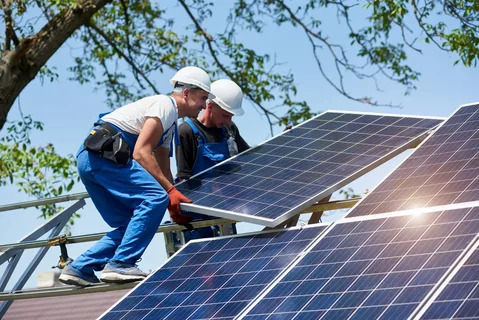Introduction
In recent years, the adoption of solar panels has seen a significant rise as homeowners and businesses recognize the numerous benefits of harnessing clean and renewable energy from the sun. Installing solar panels not only contributes to environmental sustainability but also offers financial advantages and energy independence. In this guide, we’ll explore the compelling benefits of installing solar panels for both residential and commercial applications.
1. Clean and Renewable Energy Source
One of the primary benefits of installing solar panels is the generation of clean and renewable energy. Solar power is harnessed directly from the sun, a virtually limitless and sustainable source of energy. Unlike fossil fuels, solar energy produces no harmful emissions, contributing to a cleaner and healthier environment.
2. Reduced Electricity Bills
One of the most attractive financial incentives for installing solar panels is the potential for significant savings on electricity bills. By generating your own solar power, you can reduce or even eliminate your dependence on grid electricity, leading to lower monthly bills. Additionally, some regions offer net metering programs, allowing you to earn credits for excess energy produced.
3. Return on Investment (ROI)
While the initial cost of installing solar panels can be an investment, it often pays off in the long run. The return on investment comes from the savings on electricity bills, potential government incentives, and, in some cases, selling excess energy back to the grid. Many solar panel systems have a relatively short payback period, after which the energy they produce becomes essentially free.
4. Increased Property Value
Homes and commercial properties equipped with solar panels often see an increase in market value. Potential buyers are increasingly attracted to properties with solar installations, recognizing the long-term financial benefits and environmental appeal. Installing solar panels can be viewed as an investment that enhances the overall value of the property.
5. Environmental Impact and Sustainability
Solar power is a clean and green energy source that significantly reduces carbon footprint and environmental impact. Choosing solar energy over traditional fossil fuels helps combat climate change by lowering greenhouse gas emissions. By adopting solar panels, individuals and businesses contribute to a more sustainable and eco-friendly energy landscape.
6. Energy Independence
Solar panels provide a degree of energy independence, reducing reliance on external energy sources and the fluctuating costs associated with traditional energy providers. Generating your own electricity allows you to have greater control over your energy consumption and costs, providing a sense of security and resilience.
7. Low Maintenance Costs
Solar panels have minimal maintenance requirements, making them a cost-effective energy solution. Regular cleaning and occasional checks by professionals are usually sufficient to ensure optimal performance. With no moving parts, the risk of mechanical failure is low, resulting in reduced maintenance costs over the system’s lifespan.
8. Government Incentives and Rebates
Many governments around the world offer financial incentives and rebates to encourage the adoption of solar energy. These incentives may include tax credits, grants, or rebates that offset a portion of the initial installation costs. Researching and taking advantage of available government programs can significantly reduce the overall investment in solar panels.
9. Job Creation and Economic Growth
The solar industry’s growth has led to the creation of numerous jobs in manufacturing, installation, maintenance, and research and development. As more individuals and businesses embrace solar energy, the industry continues to expand, contributing to economic growth and job creation in the renewable energy sector.
10. Grid Reliability and Resilience
Solar panels contribute to grid reliability and resilience by decentralizing energy production. Distributed solar systems reduce the risk of large-scale power outages and enhance the overall stability of the electrical grid. In times of natural disasters or emergencies, solar-powered homes and businesses can maintain a degree of energy independence.
11. Technological Advancements
Ongoing advancements in solar technology continue to improve efficiency and reduce costs. Innovations in solar panel design, energy storage solutions, and smart grid integration enhance the overall performance of solar systems. Staying abreast of technological developments allows consumers to benefit from more efficient and cost-effective solar solutions.
12. Community and Corporate Responsibility
Installing solar panels aligns with a sense of community and corporate responsibility. Businesses that adopt solar energy demonstrate environmental leadership and social responsibility, positively impacting their reputation. Additionally, individuals who choose solar contribute to a collective effort to transition toward cleaner and more sustainable energy practices.
13. Off-Grid Capability
For remote or off-grid locations, solar panels provide a reliable and sustainable source of power. Off-grid solar installations, often combined with energy storage solutions like batteries, offer electricity in areas where traditional grid connections may be impractical or cost-prohibitive.
14. Long Lifespan and Warranties
Solar panels typically have a long lifespan, often ranging from 25 to 30 years or more. Manufacturers often provide warranties that guarantee performance for a significant portion of the panel’s life. This longevity ensures a reliable and consistent energy source for an extended period.
15. Educational and Awareness Benefits
The installation of solar panels can also have educational benefits by raising awareness about renewable energy. Homeowners and businesses that install solar panels become ambassadors for sustainable living, inspiring others to explore clean energy options and contribute to a greener future.
Conclusion
The benefits of installing solar panels extend beyond financial savings, encompassing environmental sustainability, energy independence, and technological advancements. As the global focus on renewable energy intensifies, solar panels emerge as a practical and impactful solution for individuals and businesses seeking a cleaner, more sustainable energy future. Embracing solar power not only reduces carbon footprint but also contributes to a more resilient, reliable, and eco-friendly energy landscape.
Source Links:




